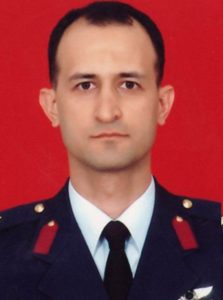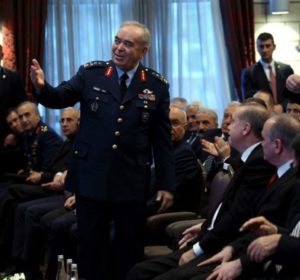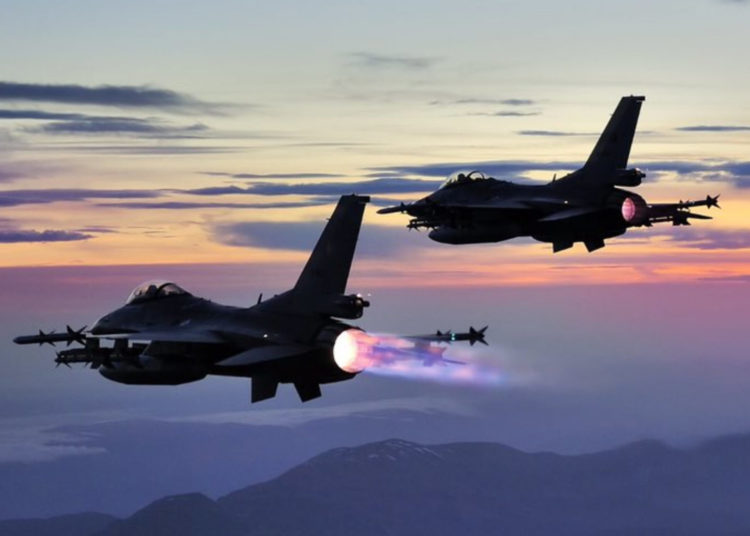Abdullah Bozkurt/Stockholm
A Turkish fighter jet pilot knew he was shooting at a Russian warplane in airspace over the Turkish-Syrian border area when he was ordered to fire by the commander of the Air Force, Gen. Abidin Ünal, a senior officer who worked at Air Force headquarters at the time revealed.
Testifying in court on on August 15, 2017, 45-year-old Staff Col. Ali Durmuş said the Combat Air Force Command reported to Ünal that two Russian fighter jets were violating Turkish airspace over the Syrian border area on November 24, 2015 and asked for instructions. Ünal ordered them to strike, which led to the downing of a Russian Sukhoi Su-24M by by a Turkish F-16 fighter jet near the border with Syria, close to where Turkey’s Hatay and Syria’s Latakia provinces meet in mountainous terrain.
“… When he was called and told about two Russian planes that were circling our border, he ordered them to shoot the jets down if they crossed into Turkish airspace, and he hung up. As a result, a few minutes after this call, a [Russian] plane that crossed into our airspace was shot down by pilots on the orders of the [air] controllers,” said Durmuş.
He also explained how the revised rules of engagement approved by the government worked differently for Russian and Syrian aircraft. Although the ultimate authority to shoot down a foreign aircraft rests with the government, the rules of engagement were developed to give the authority to make such calls to the military in order to cut short the response time because of the urgency of fast developing situations. For Syrian aircraft, the authority to make a decision to fire was delegated by the government to the pilots and air controllers through the chief of general staff and Air Force Command.
Staff Col. Ali Durmuş’s testimony on the shooting down of a Russian fighter jet in 2015:
“Since one of our planes had been shot down by Syria, this was done in order to react quickly to planes crossing the air border, which is how a Syrian plane and a helicopter were able to have been shot down,” he said.
He was referring to the shooting down of a Turkish RF-4E Phantom reconnaissance jet on June 22, 2012 by Syria after it had violated Syrian airspace near Latakia. Nordic Monitor previously published a report confirming that the flight was planned as a secret false flag operation by Turkey’s National Intelligence Organization (MİT) to push Turkey into a military incursion in its southern neighbor at the outset of the civil war in the Arab country while dragging NATO along with it.
With the revised rules of engagement, Turkish F-16 pilots shot down a Syrian helicopter in 2013 as well as a Syrian Mig 23 fighter jet in 2014 with clearance from the air controllers.
However, the rules of engagement for Russian aircraft in Syria were different, according to Durmuş, who said Russia fighter jets did not shoot at Turkish jets but rather were carrying out their activities in Syria. As a result the authority to engage Russian jets was not left to air controllers or pilots but rather remained the responsibility of the Air Force commander with the approval of the government, which delegated its authority to fire to the military.
“An assessment was made that an experienced Air Force commander would be better suited to make an an evaluation, to make a decision, with our country’s strategic and foreign policy interests in mind,” Durmuş said. In other words, shooting down a Russian jet would have far-reaching strategic and political repercussions for Turkey, and such a decision was not left to the air controller or pilot but rather delegated to the Air Force commander.

“Now, when we look at it here, the person who gave the order bears the responsibility. The pilot and air controller certainly have no responsibility here,” Durmuş underlined.
Ünal was no ordinary Air Force general, either. Unlike his predecessors, he had cultivated a close relationship with President Recep Tayyip Erdoğan, with whom he was meeting secretly without the knowledge of then-Chief of General Staff Gen. Hulusi Akar, outside the chain of command. Inside the corridors of Ankara politics, he was even rumored to be the next military chief, with his diplomat son bragging about such a prospect to friends and colleagues. This chatter about Ünal prompted the suspicious Akar to run surveillance on his movements.
When Ünal gave the order to strike the Russian jet, he knew he was carrying out the wishes of President Erdoğan.
The Air Force commander’s order to take out the Russian jet was apparently hailed as a victory by the government as well as Chief of General Staff Akar, who personally made a visit to the air base to congratulate the F-16 fighter pilot who brought down the Russian jet.
The president’s office was jubilant with the news of downing the Russian jet and leaked the information as breaking news to the media. Turkey’s semi-official Anadolu news agency quoted Turkish presidential sources as saying that the Russian SU-24 was targeted within Turkey’s rules of engagement in Syria’s Bayır-Bucak area, home to Turkmens. Russian aircraft had been pounding northern Latakia in Syria before the incident, and the Turkmens living in the area had fled to the Turkish border. Moscow said it was conducting airstrikes against what it described as terrorists.

President Erdoğan’s key role in the incident was also revealed when classified military notes were published by Nordic Monitor in December 2019. Erdoğan declared at the time that “every military element approaching Turkey from the Syrian border and representing a security risk and danger will be assessed as a military threat and treated as a military target.”
Although Erdoğan and other Turkish leaders had initially defied Russian threats and vowed to act again in line with the rules of engagement if another violation were to take place in the air, they later toned down the rhetoric. Following the agreement between Moscow and Ankara on rapprochement, Turkey’s ruling Justice and Development Party (AKP) started claiming that the government did not order the Turkish Air Force to down the Russian jet but rather maintained that the pilots acted on their own. The two pilots were accused of shooting down the Russian jet on their own initiative and were arrested in the wake of a coup attempt on July 15, 2016.
Ünal, who gave the order on the phone, retired from the military in 2017 after he played a role in the false flag coup attempt of 2016 in close coordination with Turkish intelligence agency MIT. He left an Air Force crippled by a mass purge of combat pilots that created a huge shortage of pilots in NATO’s second largest army in terms of manpower. He gave conflicting statements on his role during the failed coup and came under criticism for deliberately taking no action to stop the air force activity early on. He reportedly lives abroad today.
Durmuş was jailed by the Erdoğan government on fabricated coup plotting charges and was handed down 79 life sentences plus 3,901 years at the end of sham trials that were concluded in November 2020.












